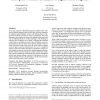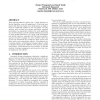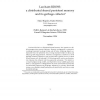386 search results - page 19 / 78 » Garbage collection for embedded systems |
OOPSLA
1992
Springer
13 years 11 months ago
1992
Springer
Generational garbage collectors are able to achieve very small pause times by concentrating on the youngest (most recently allocated) objects when collecting, since objects have b...
IWMM
2004
Springer
14 years 1 months ago
2004
Springer
Concurrent garbage collectors require write barriers to preserve consistency, but these barriers impose significant direct and indirect costs. While there has been a lot of work ...
ICFP
2012
ACM
11 years 10 months ago
2012
ACM
In the static analysis of functional programs, pushdown flow analabstract garbage collection skirt just inside the boundaries of soundness and decidability. Alone, each method re...
IWMM
2000
Springer
13 years 11 months ago
2000
Springer
Many garbage-collected systems use a single garbage collection algorithm across all applications. It has long been known that this can produce poor performance on applications for...
WDAG
1995
Springer
13 years 11 months ago
1995
Springer
Larchant-RDOSS is a distributed shared memory that persists on reliable storage across process lifetimes. Memory management is automatic: including consistent caching of data and ...




